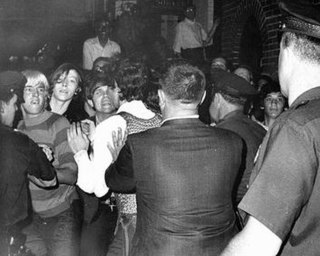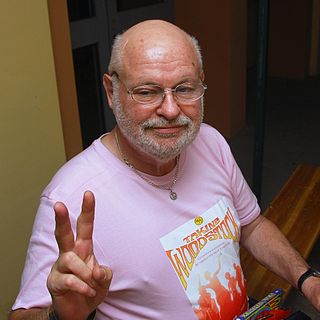Related Research Articles

The Stonewall riots were a series of spontaneous demonstrations by members of the gay community in response to a police raid that began in the early morning hours of June 28, 1969, at the Stonewall Inn in the Greenwich Village neighborhood of New York City, New York, United States of America. Patrons of the Stonewall, other Village lesbian and gay bars, and neighborhood street people fought back when the police became violent. The riots are widely considered a watershed event that transformed the gay liberation movement and the twentieth-century fight for LGBT rights in the United States.

Woodstock Music and Art Fair, commonly referred to simply as Woodstock, was a music festival held August 15–18, 1969, on Max Yasgur's dairy farm in Bethel, New York, 40 miles (65 km) southwest of the town of Woodstock. Billed as "an Aquarian Exposition: 3 Days of Peace & Music" and alternatively referred to as the Woodstock Rock Festival, it attracted an audience of more than 400,000. Thirty-two acts performed outdoors despite sporadic rain.

Bethel is a town in Sullivan County, New York, United States. The population was estimated at 4,255 in 2010. The town received worldwide attention after it served as the location of Woodstock in 1969, which was originally planned for Wallkill, New York, but was relocated to Bethel after Wallkill withdrew.

Hulk is a 2003 American superhero film based on the Marvel Comics character of the same name, directed by Ang Lee and written by James Schamus, Michael France, and John Turman from a story by Schamus. Eric Bana stars as Bruce Banner/Hulk, alongside Jennifer Connelly, Sam Elliott, Josh Lucas, and Nick Nolte. The film explores Bruce Banner's origins. After a lab accident involving gamma radiation, he transforms into a giant, green-skinned creature known as the "Hulk" whenever stressed or emotionally provoked. The United States military pursues him, and he clashes with his biological father, who has dark plans for his son.

The Wedding Banquet is a 1993 romantic comedy film directed by Ang Lee and starring Winston Chao, May Chin, Gua Ah-leh, Sihung Lung, and Mitchell Lichtenstein. The screenplay concerns a bisexual Taiwanese immigrant man who marries a mainland Chinese woman to placate his parents and get her a green card. His plan backfires when his parents arrive in the United States to plan his wedding banquet and he has to hide the truth of his gay partner.

Max B. Yasgur was an American farmer. He was the owner of the 600-acre (240 ha) dairy farm in Bethel, New York, where the Woodstock Music and Art Fair was held on August 15–18, 1969. He sold his farm in 1971 and retired to Florida, where he died in 1973.

James Allan Schamus is an American screenwriter, producer, business executive, film historian, professor, and director. He is a frequent collaborator of Ang Lee, the co-founder of the production company Good Machine, and the former CEO of motion picture production, financing, and worldwide distribution company Focus Features, a subsidiary of NBCUniversal.
Samuel S. Yasgur was an attorney; Sullivan County, New York official; and the son of Max Yasgur, who leased land on his 600 acres (2.4 km2) dairy farm in Bethel, New York for the Woodstock Music & Art Festival in August 1969. Yasgur said that his "consultations with his father" played a crucial role in the concert coming to Bethel. He grew up on his father's farm, and was a graduate of Cornell University and the University of Chicago Law School.

Michael Scott Lang was an American concert promoter, producer, and artistic manager who was best known as a co-creator of the Woodstock Music & Art Festival in 1969. Lang served as the organizer of the event, as well as the organizer for its follow-up events, Woodstock '94 and the ill-fated Woodstock '99. He later became a producer of records, films, and other concerts, as well as, the manager of performing artists, a critically acclaimed author, and a sculptor.
Joel Rosenman conceived and co-created the Woodstock Festival in 1969. Rosenman thought of the idea for the three-day concert when he and business partner John Roberts were evaluating a proposal from Michael Lang and Artie Kornfeld for a recording studio in upstate New York. The four went on to create the event. Rosenman and Roberts are the co-authors of Making Woodstock, originally published as Young Men with Unlimited Capital, a non-fiction account of their exploits as producers of Woodstock.

Woodstock: Music from the Original Soundtrack and More is a live album of selected performances from the 1969 Woodstock counterculture festival officially known as "The Woodstock Music & Art Fair". The album was compiled & produced by Eric Blackstead. Originally released on Atlantic Records' Cotillion label as a triple album on May 11, 1970, it was re-released as a 4 CD box by Mobile Fidelity Sound Labsin 1986 followed by a two-CD set released by Atlantic in 1987. Atlantic re-issued the two-CD set in 1994 correcting a few mastering errors found on their 1987 release. Veteran producer Eddie Kramer along with Lee Osbourne were the sound engineers during the three-day event.
The term Woodstock Nation refers specifically to the attendees of the original 1969 Woodstock Music and Arts Festival that took place from August 15–17 on the farm of Max Yasgur near Bethel, New York. It comes from the title of a book written later that year by Yippie activist Abbie Hoffman, describing his experiences at the festival.

White Lake is a hamlet in the town of Bethel, Sullivan County, New York, United States, on the southeastern shore of a lake of the same name. It was the closest community to the Woodstock Music Festival in 1969.

The Ice Storm is a 1997 American drama film directed by Ang Lee, based on Rick Moody's 1994 novel of the same name. The film features an ensemble cast of Kevin Kline, Joan Allen, Tobey Maguire, Christina Ricci, Elijah Wood, Katie Holmes, Glenn Fitzgerald, Jamey Sheridan, and Sigourney Weaver. Set during Thanksgiving 1973, The Ice Storm is about two dysfunctional New Canaan, Connecticut, upper-class families who are trying to deal with tumultuous social changes of the early 1970s, and their escapism through alcohol, adultery, and sexual experimentation.

Taking Woodstock is a 2009 American comedy-drama film about the Woodstock Festival of 1969, directed by Ang Lee. The screenplay by James Schamus is based on the memoir Taking Woodstock: A True Story of a Riot, a Concert, and a Life by Elliot Tiber and Tom Monte.

Ang Lee is a Taiwanese filmmaker. Born in the Pingtung County of southern Taiwan, Lee was educated in Taiwan and later in the United States. During his filmmaking career he has received international critical and popular acclaim and a range of accolades.

Elliot Michael Tiber was an artist, professor, and screenwriter who wrote a memoir about the Woodstock Festival held in Bethel, New York in 1969. He claimed responsibility for the relocation of the festival after a permit for it was withdrawn by the zoning board of a nearby town.
The Road to Woodstock is a 2009 book by Michael Lang and Holly George-Warren describing Lang's involvement in creation of the Woodstock Music & Arts Festival.
Woodstock Sound-Outs or soundouts were mini-festivals held outside Woodstock, NY from 1967 to 1970. They were the brainchild of John "Jocko" Moffitt, a roofer and drummer. He had heard about a number of folk festivals in his native California, and he wanted to stage a rock festival in a country setting. Planning for the event began in 1966 and by the early spring of 1967 performers like Richie Havens were being tentatively booked.

Woodstock is a town in Ulster County, New York, United States, in the northern part of the county, northwest of Kingston, NY. It lies within the borders of the Catskill Park. The population was 5,884 at the 2010 census, down from 6,241 in 2000.
References
- Tiber, Elliot with Tom Monte, Taking Woodstock: A True Story of a Riot, a Concert and a Life, Square One Publishers, 2007, ISBN 0-7570-0293-5